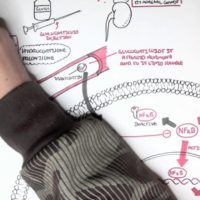OBGYN NBME was actually one of the shelf exams that I did very well on. So if OBGYN is the field of medicine you’re interested in getting into, and want a very nice shelf score, then continue reading.
Now, the shelf exam isn’t a hard one, at least if you reference surgery, internal medicine and pediatrics as comparison because those are legitimately harder shelf exams. It doesn’t take much effort to google search those core clerkships and look for advice, and see people complaining on how difficult they were. But all these NBME’s are passable and it is all based on which resources you use and how you utilize your free time to study.
As another preclude to the advice, I’d have to say that the female reproductive system is a very complex one, where tons of things can go wrong. The fact hormones regulate everything from menstrual cycle, to pregnancy, to carcinomas; it isn’t hard to realize why it can be difficult of a subject. There actually are some people who find the exam to be very hard, and sometimes not passable. I actually felt a little intimidated prior to the OBGYN core clerkship because I knew that some people found it an exam they couldn’t pass. Thankfully with the resources I used, and how I used my time, I did pretty well.
The resources I used:
1) OBGYN U-world
– I will definitely do all of these questions as they are very good questions and help you bring together concepts that you may have learned from other resources. They are also enough questions in the question bank and it isn’t like surgery where they are insufficient and practically overall, useless to pass the NBME. So I would get through all the questions and have a good idea of the keywords or lack there of, that describe a condition. What I mean by, lack there of, is that sometimes you’d have a condition that you’re pretty sure you know all the indicators for, but U-world will show you less indicators that absolutely should have you thinking of that condition. For example; endometriosis is commonly associated with dysmenorrhea, painful intercourse, painful defecation and infertility. But sometimes in the history, in a particular vignette, you may only have dysmenorrhea and infertility as your buzzwords for endometriosis.
2) NBME practice exams
– I did all 4 forms, and they are exactly like the actual NBME shelf exam. It also gives you an idea of how the questions will be presented on the actual exam. It helps you form your brain around the way these questions will be presented to you and how you need to approach them. Also, the points you get at the end when the exam is done that’s related to an overall score, is a good reflective of how you’d perform on the exam. You’d want to keep improving from form to form, to really benefit from this.
3) Firecracker
– Some people don’t have access to this but SGU students do, and because of that I am including it in my list of resources. I believe firecracker does a really good job in preparing you for the NBME. Again, OBGYN is a field that only a limited amount of things can be asked, and firecracker focuses on all of them. I only used firecracker as my reading resource.
4) Online Med Ed
– I watched a couple of online med ed videos but I felt firecracker covered enough for me, that this would have been an extra that would have been too much. But, if you don’t have access to firecracker then I’d recommend online med ed because they do a very good job in highlighting the high yield information for the shelf exams.
The first 3 resources are the only ones that I used and I made study guide sheets compiling all the information. Study guides have helped me immensely in my last two NBME preps; internal medicine and OBGYN. I wish I had implemented that studying concept, throughout all of my core NBMEs. It helps me to learn the information as I am making the notes, and also to have something to go back to and review with ease without having to go back to my resources as all the information was there for the taking. Reviewing the information over and over again, allowed it to be retained and helped me answer questions very quickly. This quickness in answering questions also transferred over to my actual examination. I actually finished with about an hour still left. This allowed me to go back to marked questions and take my time in answering them, and that is probably why I did so well. I had time to ponder over questions that weren’t as straight forward.
I guarantee if you follow my advice above, you’d do exceptionally well on your NBME. If you have any questions, please send me an email!
Related Posts
Gym – Week 3 – Becoming me again Next Post:
Gym Week 4 – Becoming Me Again
































Hey,I wish I had read this earlier. It sounds like you had a really fluid system, and I like how you stated that you improved from form to form on the NBMEs. In hindsight, after reading this I realized that one of my issues is that I saved the NBMEs for the end… out of habit, and I think I should have planned out the NBMEs from week to week.Also, taking notes on a habitual basis sounds good, but what method do you use to do it? Do you just write it out or type it up?
hey. i type up the notes into study guides. in fact, because i typed it up, anything that carried over from internal medicine or obgyn (currently prepping for my family medicine nbme), i can literally just copy and paste it.